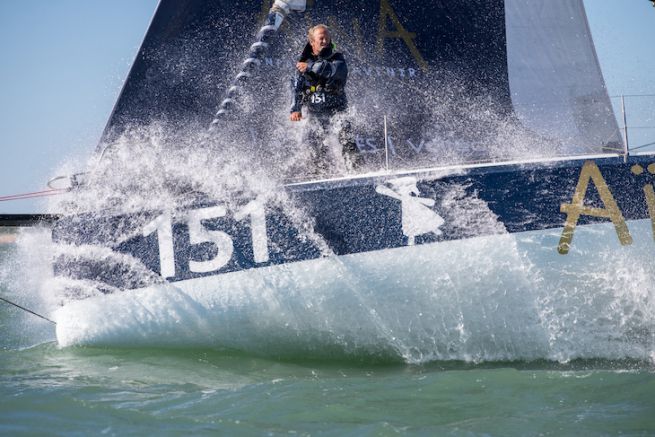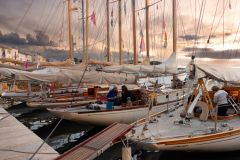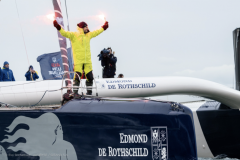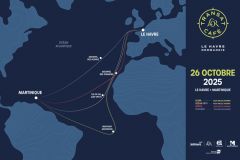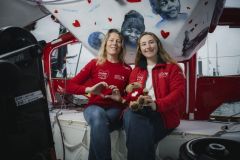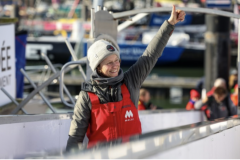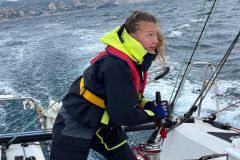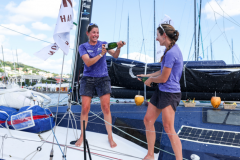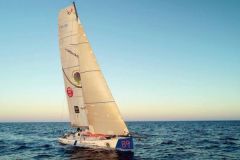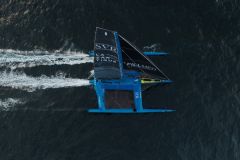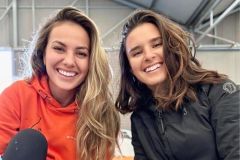Passion and work
Aymeric Chappellier is a true all-rounder of sailing. Sport studies sailing in La Rochelle, Optimist, 420, and 470 from 2000 to 2008. School of engineering - still in La Rochelle - then school of naval architecture in Nantes. Sailing and studies are closely linked, but it is nevertheless the way to the office that Aymeric will follow by integrating the Crain, Research Centre for Architecture and the Nautical Industry for 4 years. But his first love caught up with him quickly. "The ocean racing virus caught up with me."
Desires for offshore racing
In 2008/2009, Aymeric launched the construction of a Mini Proto designed by Axel de Beaufort. "We started from an existing design and redo all the structural and weight calculations." The boat, built at C3 Technologies, in Perigny, a suburb of La Rochelle, was launched in 2010.
After two years of Mini 6.50 competitions between 2011 and 2012 - he won Les Sables les Açores les Sables Les Sables that year - Aymeric was contacted to sail in Class40 on the Transat Jacques Vabre 2013. "It was on Groupe Picoty - which is still one of my partners - alongside Jean-Christophe Caso."
For two years - 2013 to 2014 - the Rochelais sailed a lot in Class40, but also took part in the Tour de France à la Voile, with the Oman Sail team, but also in IRC with 54 Teasing Machine on the Nivelt-Muratet. After a full season on the Class40 circuit, Aymeric became a préparateur for Marc Pajot and competed in the Sydney Hobart, Middle Sea Race, Caribbean 600 and Commodore's Cup.

The birth of the Class40 Aïna Enfance & Avenir
"In the meantime, I wanted to find partners to launch a Route du Rhum 2018 project. That's how we decided to build the new Class40 Aïna Enfance & Avenir designed by the architect Samuel Manuard. Construction began in early January/February 2017 and the boat was launched in June."
Today, his boat has nearly 36?000 miles of sailing. "We've sailed a lot since she was launched. We are among the most sailors in two years."
A well-born boat
For the moment, the boat has not undergone any major work. "We've made some sails evolve, done some routine maintenance like sanding, painting... It's a very well born boat. We had talked a lot with Sam Manuard and Nicolas Groleau (Editor's note: the manager of the JPS Production shipyard, where the boat was built). Many things were well thought out from the beginning and today the evolutions are ergonomic."
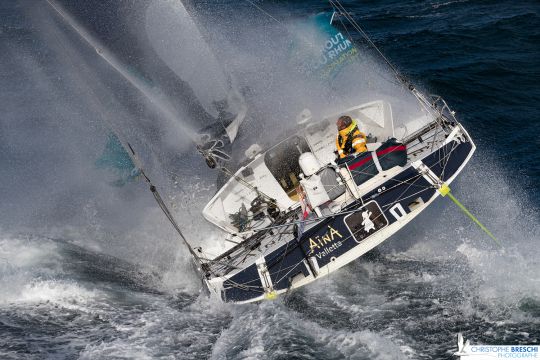
Friends in life and in sport
On this 2019 Transat Jacques-Vabre, Aymeric will be accompanied by Pierre Leboucher, two-time World Champion of 470, France's representative at the London Olympic Games in the same series in 2012 and then 9th in the last edition of the Solitaire Urgo Le Figaro.
"We've known each other since we were 15. We were partners in 420 and then in 470 with the Pôle Voile de La Rochelle. We shared many trips ensemble?! Humanely and sporty, we know each other well. We are always followed by the same physical and mental trainer. He is an excellent helmsman and a super competitor who never gives up rien?! He is a beast physically, he does trails and ultra trails?! He is a very good sailor at the Olympics, and he has been doing very well for 3 years in the Figaro. He and his partner were also interested in gaining experience on a larger boat. We're a great team and we have a card at jouer?!"
Double, a popular but exhausting format
Doubling is a format that Aymeric knows well since most of the races in 2019 in which he competed were. "Solo, it's difficult to sail the boat 100%. We can't get burned. If you push too hard, you lose clarity and you may get into trouble. We have to take it easy if we want to get to the end. On the double, we don't ask ourselves the same question. We can alternate and push the boat. It's interesting and on the other side, it's all over rien?! It is often details that make the difference."
However, even if it allows to gain in performance, the double has its limits. "On long crossings, the double format is more energy consuming. We rest more easily than in solo, but physically we arrive more destroyed. We draw from our reserves, we give more. For example, on a grain, you change the sail 3 times and when there are 10 grains during the day, it's as many changes of sail."
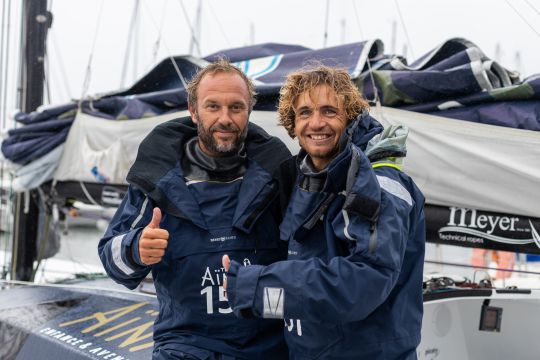
The Transat Jacques Vabre 2019, a plateau raised in Class40
"The Transat Jacques Vabre is an objective important?!" Two years ago, Aymeric finished in second place, only 15 minutes behind V and B led by Maxime Sorel and Antoine Carpentier, due to a technical breakdown. "I have a little revenge to take."
With new boats, new skippers, the Class40 plateau will be raised. "It's a great challenge. I go there to walk as well as I can, to have a taste for the work done, to make a nice trace and to push the boat. There will be excellent sailors and I would have gone back up to do everything right and finish ahead."
It will therefore be necessary to count on several very good duets. About 4 or 5 boats are potentially dangerous, including the new Class40s, as Aymeric explains. "Today, we know that new boats can perform under certain conditions. But they came out late and their skipper has little experience on it."
It will also be necessary to juggle with winter weather conditions at Le Havre, which can sometimes cause damage to the fleet, as demonstrated by the 2018 Route du Rhum. "We'll see if there are any big depressions and how everyone is handling it. We'll be attacking anyway. We know we're starting under difficult conditions and that's part of the game."

A sporting cause, but in solidarity
In 2013, Aymeric began its partnership with the Reunionese association Aïna Enfance & Avenir, which has been working since 2005 in Madagascar with poor populations (children and young mothers at risk). After a meeting with the president and director of the association accompanied by two children, he decided to go there to discover how it works. It is thanks to this "human encounter" that he will embark on this associative project.
"In total, the association takes care of 300 young children and young mothers. And as its name suggests, childhood is as important as the future. Because the idea is to accompany them and follow them to the end. The association helps mothers to find a job, housing and independence and provides children with schooling from an early age in two supportive schools. Because school is only free from the age of 5 in Madagascar. Before, they are left to their own devices and few will go to school in the end. It gives them a better chance of getting an education."
Aïna Enfance & Avenir is also a solidarity crèche for very young mothers - between 13 and 17 years old. "They learn hygiene, vaccination and training. Many of them find work and send one of their children to school. The association helps them build a better future. It's a great partnership and they need a hand."
